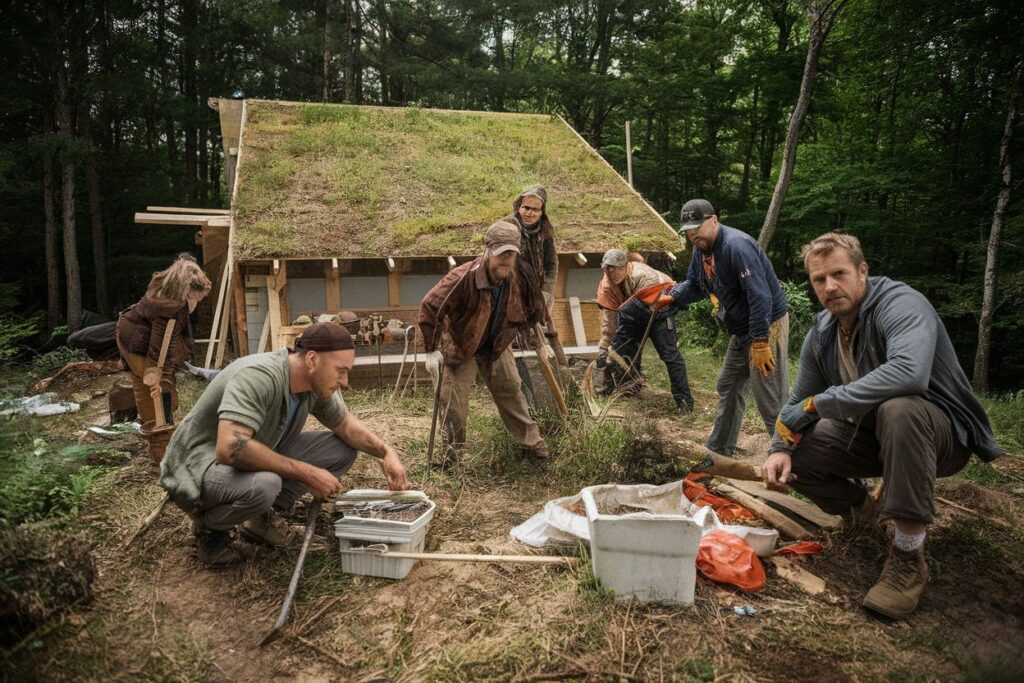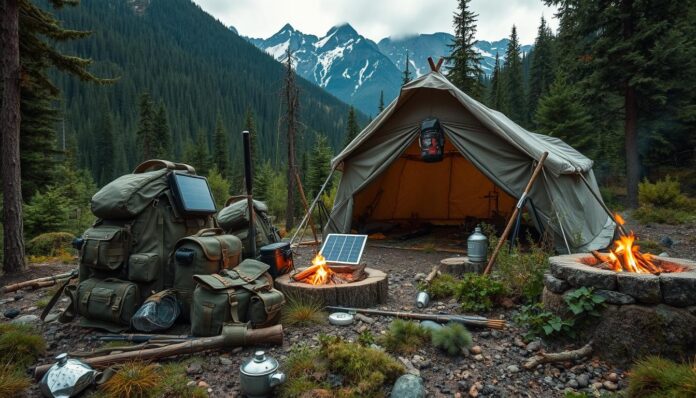An extreme survivalist is someone who focuses a lot on being ready for disasters. They learn skills to handle big problems. This helps them stay strong when society might fall apart.
These survivalists are different from casual preppers. They live off the grid and are always ready for emergencies. They use special techniques to get ready for many kinds of disasters.
The main idea behind extreme survivalism is being in control and managing risks. They learn important survival skills. This helps them build strong systems to face unknown challenges.
Why do people become extreme survivalists? They want to keep their families safe in emergencies. They work hard to be self-sufficient. They keep learning, manage resources well, and get ready mentally.
Extreme survivalism is more than just a hobby. It’s a way of life. It’s about being flexible, knowing a lot, and being well-prepared in a world that’s getting more complex.
Defining the Extreme Survivalist Mindset
The survivalist mentality is more than just being ready for emergencies. It’s a strong belief in being self-reliant and ready for anything. This mindset shapes how people face threats in our changing world.
Extreme survivalists see being prepared as a way of life, not just a hobby. They plan for all kinds of dangers, from natural disasters to big changes in society.
Core Beliefs and Philosophy
Survivalists deeply believe in being self-sufficient. They take full responsibility for their safety, not counting on others or the government in tough times.
“Preparedness is not about fear, but about empowerment and control.” – Survival Expert
Psychological Aspects of Extreme Preparedness
Survivalists are very aware of threats. They carefully look at risks and plan for them, going beyond basic emergency plans. This comes from a strong belief in being resilient and planning ahead.
Difference Between Casual and Extreme Survivalists
Casual preppers might have some emergency supplies. But extreme survivalists put a lot of time and effort into their plans. They learn special skills, stock up on supplies, and make detailed plans for different situations.
Essential Skills and Training of an Extreme Survivalist
Extreme survivalists know that learning key skills can save lives in tough places. They focus on wilderness survival training. This training helps them stay alive in unpredictable situations.
“Survival is not about equipment, but about knowledge and mental preparedness” – Military Survival Instructor
First aid is a top priority for them. They learn advanced medical skills, like treating serious injuries and diagnosing complex health issues. They also know how to do critical medical actions without a doctor nearby.
Self-defense and tactical training are also key. They learn how to fight, handle weapons, and avoid dangers. Navigation is another important skill. They learn to read the terrain and use tools to stay on track in different landscapes.
Foraging is a vital skill too. They learn to find and eat plants, understand nature, and find water. Their training teaches them how to find food in the wild that can keep them alive.
Extreme survivalists are always learning and practicing. They do regular training and stay up-to-date with new survival methods. This keeps them ready for any challenge.
Advanced Survival Gear and Equipment

Extreme survivalists know that the right gear can save lives. They go beyond basic supplies, choosing top-notch equipment for survival.
They pick tools that are reliable and versatile. These are not just extras but essential for staying alive in emergencies.
Emergency Communication Systems
When regular networks fail, good communication is key. Satellite phones, hand-crank radios, and advanced devices keep survivalists connected. They’re built to last in tough conditions.
Long-term Food Storage Solutions
Storing food for the long haul needs special methods. Vacuum-sealed, dehydrated, and nitrogen-packed foods last a long time. Survivalists choose high-calorie, nutrient-rich foods that stay good for years.
Off-grid Power Systems
Having your own power is vital for survival. Solar panels, portable generators, and batteries provide power anywhere. They’re small and light, perfect for emergency kits.
“Survival is not about having the best gear, but knowing how to use what you have effectively.” – Wilderness Survival Expert
Sustainable Living and Self-Sufficiency Methods

Extreme survivalists know that being truly resilient is more than just stockpiling. Sustainable living is key for long-term survival. It combines permaculture with practical self-sufficiency techniques.
Renewable energy is at the heart of sustainable homesteading. Solar panels, wind turbines, and small hydroelectric generators offer reliable power. They keep essential systems running when you’re off the grid.
“Self-sufficiency is not about isolation, but creating a resilient ecosystem that supports human survival.” – Sustainable Living Expert
Water purification is also vital for survival. Advanced filters, rainwater harvesting, and biological methods ensure clean water. These solutions turn environmental challenges into opportunities for sustainable water management.
Sustainable agriculture is crucial for self-sufficiency. Permaculture helps create food systems that work with nature. Techniques like vertical gardening, aquaponics, and regenerative farming boost food production in small spaces, ensuring you have what you need.
By using these sustainable methods, extreme survivalists build strong, flexible strategies. These go beyond just emergency preparedness.
Final Thoughts
The extreme survivalist lifestyle is more than just getting ready for emergencies. It’s a deep commitment to being strong and self-sufficient. People who follow this path learn to turn weaknesses into strengths through hard training and smart planning.
In the survival community, people share knowledge and support each other. This creates strong social bonds that help everyone stay safe. The skills they learn help them see the power of teamwork and personal growth.
As the world keeps changing, the need for survival skills grows. Building resilience is now about being smart and ready, not just scared. People are learning to not just survive but to thrive in tough times.
Extreme survivalism shows us a new way to think about our potential. It makes us question what it means to be vulnerable. It teaches us to be flexible, learn new skills, and plan for the future. This way, we can face the unknown with confidence and strength.











